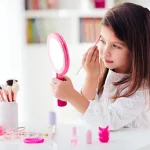In the vibrant world of childhood development, the benefits of dramatic play for children are both profound and multifaceted. Dramatic play, which includes activities like role-playing, storytelling, and imaginative scenarios, serves as a cornerstone for nurturing various essential skills in children. Whether you are a parent, educator, or makeup professional, understanding these benefits can enhance how you support and engage with children in their creative journeys. This comprehensive guide delves into the myriad advantages of dramatic play, highlighting its significance in fostering well-rounded and confident individuals.
What Are the Benefits of Dramatic Play for Children?
Understanding Dramatic Play
What is Dramatic Play?
Dramatic play, also known as pretend play, is a form of creative activity where children use their imagination to act out roles, scenarios, and stories. This type of play often involves costumes, props, and collaborative storytelling, allowing children to explore different aspects of life and their own identities. Whether pretending to be a doctor, a superhero, or a chef, children engage in dramatic play to make sense of the world around them.
Read Also: When Should Kids Start Playing with Makeup?
The Role of Makeup in Dramatic Play
For makeup professionals, dramatic play presents a unique opportunity to contribute to a child’s imaginative experiences. Makeup can be a powerful tool in dramatic play, enabling children to transform into various characters and express their creativity. When used appropriately, makeup enhances the authenticity of their play and supports the development of fine motor skills and artistic expression.
The Benefits of Dramatic Play for Children
Enhancing Creativity and Imagination
One of the most significant benefits of dramatic play for children is the enhancement of creativity and imagination. When children engage in pretend play, they are encouraged to think outside the box, invent stories, and create unique characters. This creative freedom not only makes playtime enjoyable but also stimulates cognitive development and innovative thinking.
Read Also: The Benefits of Kids Makeup in Dramatic Play
Developing Social Skills
Dramatic play is inherently social, often involving interaction with peers, siblings, or adults. Through role-playing, children learn to communicate effectively, negotiate roles, share ideas, and collaborate with others. These interactions help them develop essential social skills, such as empathy, cooperation, and conflict resolution, which are crucial for their future relationships and community involvement.
Watch Also:
Emotional Development
Engaging in dramatic play allows children to express and manage their emotions in a safe and controlled environment. By acting out different scenarios, children can explore a range of feelings, from joy and excitement to fear and frustration. This emotional exploration helps them understand and regulate their emotions, fostering emotional intelligence and resilience.
Read Also: Makeup for Kids: Creative Ideas for Face Painting
Cognitive Development
Dramatic play contributes significantly to cognitive development by enhancing problem-solving skills, memory, and attention to detail. As children create and navigate through various storylines, they engage in critical thinking and decision-making processes. This mental exercise strengthens their ability to analyze situations, predict outcomes, and adapt to new challenges.
Language Skills
Language acquisition is another key benefit of dramatic play. Through storytelling and role-playing, children expand their vocabulary, improve their sentence structure, and practice conversational skills. Engaging in dialogue with others during play enhances their ability to articulate thoughts clearly and listen actively, which are vital components of effective communication.
Read Also: The Best Storage Solutions for Kids Makeup Collections
Building Confidence and Self-Esteem
Successfully creating and performing roles in dramatic play boosts a child’s confidence and self-esteem. When children take on different characters and navigate through various scenarios, they gain a sense of accomplishment and pride in their abilities. This positive reinforcement encourages them to take on new challenges and believe in their potential.
Fine Motor Skills
Dramatic play often involves manipulating objects, costumes, and props, which helps develop fine motor skills. Activities like dressing up, using makeup, and handling small items improve hand-eye coordination, dexterity, and precision. These skills are essential for everyday tasks and academic activities, such as writing and drawing.
Read Also: How Can I Look Pretty with Little Makeup?
Understanding the World Around Them
Through dramatic play, children gain a deeper understanding of the world and its various roles and responsibilities. By simulating real-life situations, they learn about different professions, cultural practices, and social norms. This experiential learning fosters a broader perspective and appreciation for diversity and community.
Encouraging Problem-Solving and Critical Thinking
Dramatic play often presents children with challenges that require creative solutions. Whether figuring out how to resolve a conflict between characters or navigating a storyline, children develop problem-solving and critical thinking skills. These abilities are fundamental for academic success and everyday decision-making.
Read Also: How to Create a Glamorous Look with Kids Makeup
Promoting Empathy and Understanding
By stepping into the shoes of different characters, children develop empathy and a better understanding of others’ perspectives. This emotional intelligence is crucial for building strong, compassionate relationships and fostering a sense of community and belonging.
The Role of Makeup in Enhancing Dramatic Play
Makeup as a Tool for Transformation
Makeup plays a pivotal role in dramatic play by allowing children to transform their appearance and fully immerse themselves in their chosen characters. Whether it’s painting a superhero mask, adding fairy wings, or creating a pirate’s eye patch, makeup enhances the authenticity of their roles and makes the play experience more engaging and realistic.
Read Also: Kids Makeup Ideas for Different Age Groups
Safety Considerations
For makeup to be a beneficial part of dramatic play, it’s essential to use child-safe, non-toxic products. Parents and makeup professionals should ensure that the makeup used is hypoallergenic and easily removable. Teaching children proper application techniques and hygiene practices also contributes to a safe and positive makeup experience.
Tips for Encouraging Dramatic Play
Creating a Stimulating Environment
A stimulating environment is key to fostering dramatic play. Provide a dedicated space with various props, costumes, and materials that inspire creativity. Themes like a kitchen, a doctor’s office, or a magical castle can spark imaginative scenarios and encourage children to explore different roles.
Read Also: Can You Mix Foundation with Moisturizer for Kids?
Providing Props and Costumes
Props and costumes are essential elements of dramatic play. They not only make the experience more authentic but also stimulate creativity and storytelling. From simple items like hats and scarves to more elaborate costumes, providing a variety of options allows children to experiment and express themselves freely.
Participating with Children
Active participation from parents and caregivers can significantly enhance the benefits of dramatic play. Engaging in play with children demonstrates support and encourages them to take creative risks. It also provides opportunities for bonding and sharing in their imaginative worlds.
Read Also: The Easiest Way to Combine Sunscreen and Makeup for Kids
Incorporating Makeup Safely
When integrating makeup into dramatic play, prioritize safety by choosing age-appropriate products and supervising their use. Encourage children to experiment with colors and designs while teaching them to handle makeup tools responsibly. This approach ensures that makeup remains a fun and enriching part of their playtime.
Frequently Asked Questions (FAQ)
What is dramatic play, and why is it important for children?
Dramatic play is a form of imaginative play where children act out roles and scenarios. It is important because it fosters creativity, social skills, emotional intelligence, cognitive development, and language acquisition, all of which contribute to a child’s overall growth and well-being.
Read Also: How to Combine Sunscreen and Makeup for Kids: A Fun Guide for Ladies and Little Ones
At what age should children start engaging in dramatic play?
Children can begin engaging in dramatic play as early as preschool age (3-5 years). At this stage, they start to explore roles and scenarios, using their imagination to create stories and interact with others. As they grow older, their ability to engage in more complex and structured dramatic play increases.
How does dramatic play enhance a child’s creativity?
Dramatic play encourages children to invent stories, create characters, and explore different scenarios. This imaginative process stimulates creative thinking, allowing children to develop unique ideas and solutions, and fosters an innovative mindset that benefits various aspects of their lives.
Read Also: Protecting Kids’ Skin: Sunscreen and Makeup Combos
Can makeup be safely used in dramatic play for young children?
Yes, makeup can be safely used in dramatic play when using child-friendly, non-toxic, and hypoallergenic products. Parents and caregivers should supervise makeup play, teach proper application and removal techniques, and ensure that makeup is used responsibly to maintain safety and hygiene.
What are some common themes for dramatic play?
Common themes for dramatic play include professions (doctors, firefighters, teachers), fantasy worlds (fairies, superheroes, pirates), daily activities (cooking, shopping, traveling), and family roles (parents, siblings, caregivers). These themes help children explore different aspects of life and develop a deeper understanding of their surroundings.
Read Also: Easiest Blush to Apply on Kids [2024]
How can parents support their children’s dramatic play at home?
Parents can support their children’s dramatic play by providing a variety of props and costumes, creating a dedicated play space, actively participating in play sessions, encouraging imaginative storytelling, and respecting their child’s creative choices. Additionally, incorporating makeup play can further enhance the experience.
What are the social benefits of dramatic play?
The social benefits of dramatic play include improved communication skills, enhanced empathy, better cooperation and teamwork, and the ability to negotiate and resolve conflicts. These skills are essential for building strong relationships and functioning effectively in social settings.
Read Also: What Type of Blush is Best for Beginners [2024]?
How does dramatic play contribute to language development?
Dramatic play involves a lot of dialogue and storytelling, which helps children expand their vocabulary, improve their sentence structure, and practice conversational skills. Engaging in role-playing and narrative creation enhances their ability to express thoughts clearly and understand others better.
Are there any downsides to dramatic play that parents should be aware of?
When supervised and conducted in a safe environment, dramatic play has minimal downsides. However, excessive play without balance may lead to neglect of other activities. Additionally, if not guided properly, children might adopt negative behaviors or stereotypes. It’s important to provide balanced playtime and promote positive role models.
Read Also: 10 side effects of wearing makeup at a young age [2024]
How can makeup professionals contribute to the benefits of dramatic play?
Makeup professionals can enhance dramatic play by designing age-appropriate makeup looks, teaching safe application techniques, providing educational workshops, and collaborating with parents and educators to integrate makeup into creative activities. Their expertise ensures that makeup is used safely and effectively to support children’s imaginative experiences.
Read Also: The Psychological Impact of Makeup on Kids: Insights and Advice
Conclusion
Exploring the benefits of dramatic play for children reveals its essential role in fostering creativity, social skills, emotional intelligence, cognitive development, and much more. Dramatic play serves as a fundamental building block for nurturing well-rounded, confident, and empathetic individuals. By providing a supportive environment, incorporating tools like makeup, and actively participating in play, parents, educators, and makeup professionals can significantly enhance the developmental journey of children. Embracing dramatic play not only enriches a child’s childhood experience but also lays the foundation for a lifetime of learning, growth, and meaningful relationships.
Read Also: How Does Makeup Affect Children?



